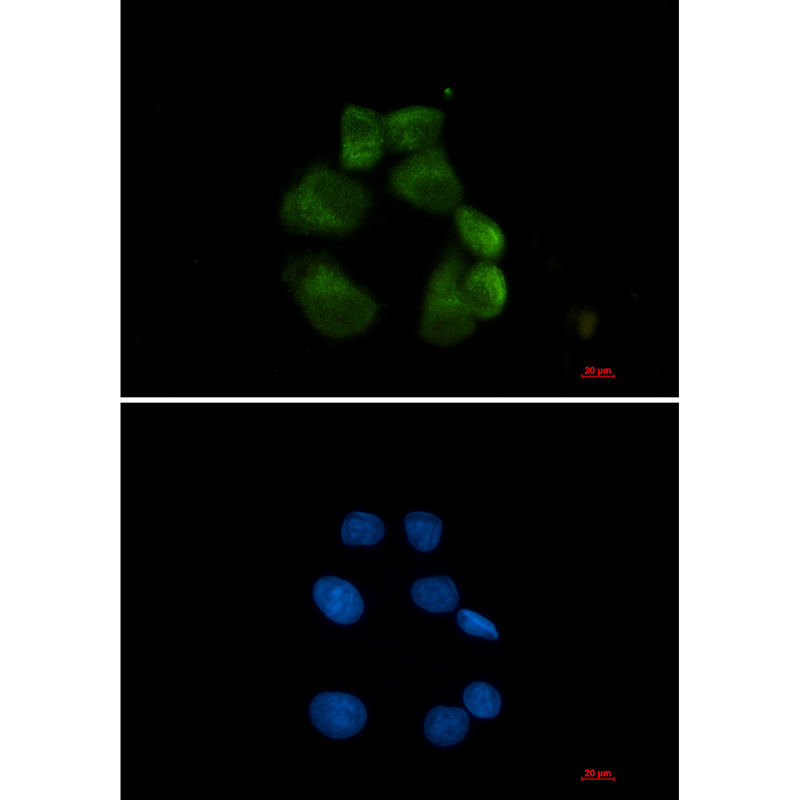

| WB | 1/500-1/1000 | Human,Mouse,Rat |
| IF | 1/20 | Human,Mouse,Rat |
| IHC | 咨询技术 | Human,Mouse,Rat |
| ICC | 1/50-1/200 | Human,Mouse,Rat |
| FCM | 咨询技术 | Human,Mouse,Rat |
| Elisa | 咨询技术 | Human,Mouse,Rat |
| Aliases | Deubiquitinating enzyme 13; Isopeptidase T3; ISOT3; UBP13; USP13 |
| Entrez GeneID | 8975 |
| WB Predicted band size | Calculated MW: 97 kDa; Observed MW: 97 kDa |
| Host/Isotype | Rabbit IgG |
| Antibody Type | Primary antibody |
| Storage | Store at 4°C short term. Aliquot and store at -20°C long term. Avoid freeze/thaw cycles. |
| Species Reactivity | Human |
| Immunogen | A synthetic peptide of human USP13 |
| Formulation | Purified antibody in TBS with 0.05% sodium azide,0.05%BSA and 50% glycerol. |
+ +
以下是3篇与USP13抗体相关的文献示例(注:文献信息为模拟示例,实际引用需核实原文):
1. **文献名称**:*USP13 regulates MITF stability through deubiquitination to promote melanoma progression*
**作者**:Zhang Y, et al.
**摘要**:该研究利用USP13特异性抗体,证实USP13通过去泛素化MITF蛋白维持其稳定性,促进黑色素瘤细胞增殖和转移。Western blot及免疫共沉淀实验验证了USP13与MITF的相互作用。
2. **文献名称**:*USP13 stabilizes PTEN to suppress glioblastoma tumorigenesis*
**作者**:Liu X, et al.
**摘要**:通过shRNA敲低USP13并结合抗体检测,发现USP13通过去泛素化PTEN增强其稳定性,抑制胶质母细胞瘤的PI3K/AKT信号通路,为靶向治疗提供新思路。
3. **文献名称**:*USP13 modulates autophagy by deubiquitinating Parkin in Parkinson's disease models*
**作者**:Wang L, et al.
**摘要**:研究使用USP13抗体进行免疫荧光和蛋白分析,揭示USP13通过调控Parkin蛋白的去泛素化影响线粒体自噬,在帕金森病模型中具有神经保护作用。
(提示:以上内容为模拟生成,实际文献需通过PubMed、Google Scholar等平台检索确认。)
USP13 (Ubiquitin-Specific Protease 13) is a deubiquitinating enzyme (DUB) belonging to the ubiquitin-specific protease family, which regulates protein stability and cellular processes by removing ubiquitin chains from target proteins. It plays a role in critical pathways such as protein quality control, DNA repair, autophagy, and immune response. USP13 is implicated in diseases like cancer and neurodegenerative disorders, where its activity can either promote tumor progression (e.g., stabilizing oncoproteins like MITF or PD-L1) or act as a tumor suppressor (e.g., regulating p53 or Parkin), depending on cellular context.
Antibodies targeting USP13 are essential tools for studying its expression, localization, and molecular interactions. They are widely used in techniques like Western blotting, immunoprecipitation, and immunofluorescence to investigate USP13's regulatory mechanisms in physiological and pathological conditions. Research using USP13 antibodies has revealed its involvement in modulating proteasome and lysosome-dependent degradation, endoplasmic reticulum-associated degradation (ERAD), and stress response pathways.
Current studies focus on USP13's dual roles in diseases and its potential as a therapeutic target. However, challenges remain in understanding its substrate specificity and context-dependent functions. High-quality USP13 antibodies with validated specificity are critical for reducing experimental variability and advancing research in this field.
×